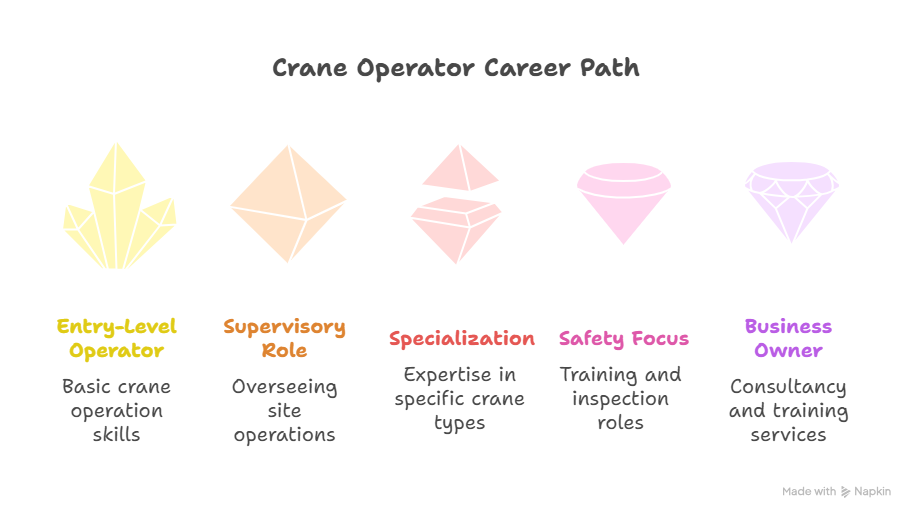
Operating a crane is one of the most in-demand skilled trades in construction and heavy industry. Crane operators play a vital role in building infrastructure, handling shipping containers, and supporting large-scale projects across the United States. If you’re interested in pursuing this career path, here’s a step-by-step guide on how to become a crane operator in the USA.
What Does a Crane Operator Do?
Crane operators use heavy lifting equipment to move materials like steel beams, concrete, shipping containers, or machinery. They must understand safety protocols, equipment controls, and load calculations to ensure safe and efficient operations. According to the U.S. Bureau of Labor Statistics (BLS), crane operators fall under the broader category of “Material Moving Machine Operators,” with over 45,000 jobs in 2023 (BLS).
Step 1: Meet the Basic Requirements
Before beginning formal training, you must:
- Be at least 18 years old.
- Have a high school diploma or GED.
- Be in good physical condition (passing a medical exam is often required).
- Possess a valid driver’s license.
Step 2: Enroll in Crane Operator Training
Crane operator training programs are offered through:
- Vocational schools and community colleges
- Apprenticeships through trade unions like the International Union of Operating Engineers (IUOE)
- Private training centers accredited by the National Commission for the Certification of Crane Operators (NCCCO)
These programs teach equipment operation, safety procedures, load charts, and hands-on practice with different types of cranes.
Step 3: Obtain NCCCO Certification
In the United States, most employers require certification from the NCCCO. The certification process includes:
- A written exam covering safety, load charts, and operational theory.
- A practical test where you operate a crane in a controlled setting.
Several states and cities legally require NCCCO or equivalent certification, so this step is critical for employability.
Step 4: Gain On-the-Job Experience
Many employers prefer candidates with practical worksite experience. Entry-level roles may involve assisting senior operators, rigging, or working as a signal person before progressing to full operator duties.
Step 5: Apply for State Licensure (If Required)
Some states, including California, New York, New Jersey, and Washington, have specific licensing requirements for crane operators. Always check your state’s Department of Labor or licensing board for local rules.
Step 6: Stay Current with Safety and Recertification
NCCCO certifications are valid for five years. Operators must recertify to ensure they remain up to date with safety standards and best practices. Continuous training helps operators adapt to new equipment and regulations.
Salary and Job Outlook
Crane operation is a stable and well-paying career. According to the BLS, the median annual wage for crane operators in 2023 was $64,000, with the top 10% earning more than $90,000 (BLS). Job growth is expected to remain steady as construction and infrastructure projects expand nationwide.
Career Advancement
With experience, crane operators can:
- Move into supervisory roles such as site foreman.
- Specialize in tower cranes or mobile cranes for higher pay.
- Transition into safety training or inspection roles.
- Start a training business or consultancy, helping companies and new operators meet certification and safety requirements.

FAQs About Becoming a Crane Operator
1.How long does it take to become a crane operator?
Most training programs take 3-6 months, but apprenticeships can last up to 3-4 years depending on specialization (NCCCO).
2. Do I need a college degree to be a crane operator?
No, only a high school diploma or GED is required, along with formal training and certification.
3.Is crane operation a dangerous job?
It can be risky without proper training, but strict OSHA safety regulations and modern equipment technology help reduce workplace accidents (OSHA).
4. Can veterans transition into crane operation?
Yes, many training schools and unions offer programs specifically for veterans, sometimes with financial assistance through the GI Bill.
5. What types of cranes can I specialize in?
Operators can train on tower cranes, mobile cranes, overhead cranes, and rough-terrain cranes, each offering unique career opportunities and pay levels.
RELATED POST:
GIPHY App Key not set. Please check settings